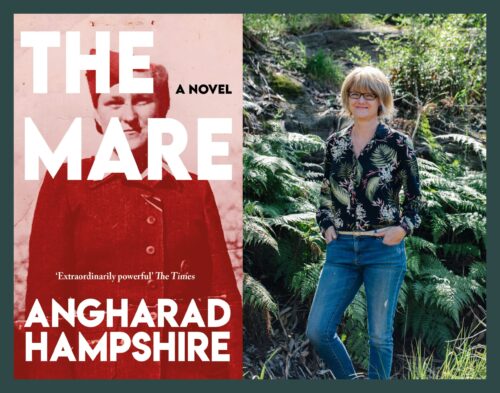Shortlist Spotlight: Angharad Hampshire
29th May, 2025
This week’s Shortlist Spotlight is on Angharad Hampshire, who tells us more about writing The Mare.
Q: How do you feel about being shortlisted for the Walter Scott Prize for Historical Fiction? Do you consider yourself an historical novelist?
A: I am over the moon! The Walter Scott Prize is such an important literary award, and the list of other authors is fantastic. I’m currently reading my way through the shortlist; I’m beyond honoured to be in such amazing company.
My background is as a journalist. Though I’ve written a lot of print journalism, this is my first novel, so I’ve only recently started calling myself a novelist! I do like the frame a real story provides, and I suspect that the attention to detail and obsession with fact that journalism has given me lends itself to historical fiction. I love reading stories that help me to understand the world better. Recently, I read Brotherless Night by V.V. Ganeshananthan, a beautiful, brutal, gut-punch of a novel, which led me to reading up on the Tamil Tigers; historical fiction sparks that sort of interest. To me, the most important aspect of any fiction, regardless of genre, is that it is well-written. I have broad, genre-crossing taste, and I’m really interested in form. I wouldn’t want to limit the possibility of writing something quite different in due course. That said, my ideas for my next two books are historical fiction!
Q: How did the people and times you write about in this novel first lodge in your imagination?
A: I read an article about Hermine Braunsteiner in the New York Times in December 2015. There were so many things about her life that I couldn’t stop thinking about: why hadn’t I heard of such a historically important figure? Who were the female camp guards? How did she hide her past from her husband? Why on earth would he stay with her when he found out what she’d done? I found the moral complexity of the story fascinating and was amazed no one had written it as a book. Barely a month later, I read this quote by the brilliant writer Toni Morrison: “If there’s a book you want to read but it hasn’t been written yet, then you must write it.” So that’s what I did.
Q: What place does research have in your writing? When does the fiction take over from the facts?
A: I don’t think you could write a book like The Mare without thorough research. It’s too important a subject not to handle carefully and with respect. It was paramount to me that it was as historically accurate as I could make it. The female camp guards are a fascinating area of Holocaust history that only a handful of historians have examined. I wrote The Mare as part of a Doctor of Arts at the University of Sydney, which gave me the time and brain space to conduct in-depth historical and academic research. A lot of that research has made its way into the novel. For example, the scenes of violence are all based on witness testimony (of which I read hundreds). However, I am also very clear that it is fiction. There are things about Hermine and Russell that we can never know. I had to imagine myself in both of their shoes. This is where fiction took over from fact. It is historical fiction not a history book.
Q: Can writing about the past help us to deal with the present and think about the future?
A: Yes, absolutely. I believe passionately in the power of literature. Certainly, writing The Mare changed my life. It changed who I am and how I think. To me, the best historical fiction says something about human beings and our planet that resonates today. That is certainly what I have tried to do with my book. If we examine history – both the good and the bad – with genuine nuance, we might learn some lessons from the past to make a better future. The problem is that we often think those lessons apply to other people not ourselves.

